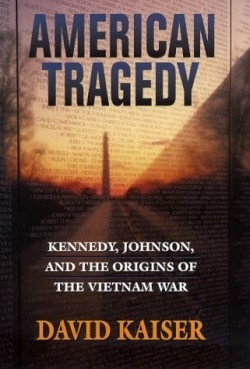American Tragedy
Kennedy, Johnson, and the Origins of the Vietnam War
“The greatest foreign policy miscalculation” is what the author, a professor at the Naval War College, calls the Vietnam War. Although hardly a startling observation, few, if any, historians have surpassed Kaiser’s meticulous research to justify this seemingly obvious conclusion. He spent nine years investigating the most recently declassified volumes of the Foreign Relations of the United States and other primary resources to arrive at some bold, well-documented interpretations of the War’s origins. Unfortunately, the CIA ignored his requests for papers that should have been made available under the Freedom of Information Act.
The leading characters in this tragedy include Presidents Eisenhower, Kennedy and Johnson, their respective cabinet members and the Joint Chiefs of Staff. Kaiser develops an intriguing model of intergenerational leadership refined from the pioneering work of historians William Strauss and Neil Howe, who identify the Vietnam era leaders as products of the “GI Generation”—those born between 1901 and 1924 and who led America to victory in World War II.
In sharp contrast to Americans born before 1901 and after 1924, the GI Generation that led the nation into the war contained almost no doubters about the wisdom or the success of the enterprise. This, as much as anything else, probably accounted for the decision not only to enter the war but also to persevere for eight fruitless years.
Kaiser views the war as a logical, but not inevitable consequence of the early Cold War years. He faults Eisenhower much more than Kennedy for escalation, a view disputed by other historians. Eisenhower’s reliance on nuclear weapons instead of conventional troops nearly resulted in an international disaster as he tried to impose a pro-Western democracy in Laos.
Although Kennedy was a member of the GI Generation, he was much more successful than Eisenhower at curbing the warlike intentions of his advisors, especially those of his self-promoting Secretary of Defense Robert McNamara. The author skillfully describes the backbiting among Kennedy’s advisors and places the war in context. The nuclear test ban, Civil Rights Movement, tensions between East and West Germany and relations with the Soviet Union were more important issues during the early Sixties.
Any success that Kennedy might have had in ending the war died with him. Unlike Kennedy, President Johnson never considered withdrawal or a neutral Vietnam as possibilities. As the war continued to tear America apart, shows of strength became increasingly important to Johnson, his advisors and the military, and full-scale war with nuclear weapons was considered before his resignation in 1968.
The final years and failures of American-Vietnam diplomacy are well told by Jeffrey Kimball in Nixon’s Vietnam War (University Press of Kansas, 1998). Kaiser’s inquiry will probably not go unchallenged, but will remain an authoritative appraisal of the causes of the War for years to come.
Disclosure: This article is not an endorsement, but a review. The publisher of this book provided free copies of the book to have their book reviewed by a professional reviewer. No fee was paid by the publisher for this review. Foreword Reviews only recommends books that we love. Foreword Magazine, Inc. is disclosing this in accordance with the Federal Trade Commission’s 16 CFR, Part 255.

